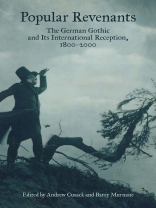The first book in English on the German Gothic in over thirty years, consisting of new essays investigating the internationality of the Gothic mode.
The literary mode of the Gothic is well established in English Studies, and there is growing interest in its internationality. Gothic fiction is seen as transgressive, especially in the way it crosses borders, often illicitly — for instance, in the form of plagiarized texts or pseudo-translations of nonexistent sources. In the 1790s, when the English Gothic novel was emerging, the real or ostensible source of many of these uncanny texts was Germany. Thisfirst book in English dedicated to the German Gothic in over thirty years is aimed at students and researchers in German Studies and English Studies, and redresses deficiencies in existing sources, which are outdated, piecemeal, or not sufficiently grounded in German Studies.
The book examines the international reception of German Gothic since the 1790s heyday of the Gothic novel in Britain and Germany; traces a line of Gothic writing in German to thepresent day; and inquires into the extraliterary impact of German Gothic. Thus the essays do full justice to the Gothic as a site of conflict and exchange — both between cultures and between discourses.
Contributors:Peter Arnds, Silke Arnold-de Simine, Jürgen Barkhoff, Matthias Bickenbach, Andrew Cusack, Mario Grizelj, Jörg Kreienbrock, Barry Murnane, Victor Sage, Monika Schmitz-Emans, Catherine Smale, Andrew Webber
Andrew Cusack is Alexander von Humboldt Research Fellow at the Institut für Kulturwissenschaft of the Humboldt-Universität Berlin. Barry Murnane is Assistant Professor of German and Comparative Literature at the Martin-Luther-Universität Halle-Wittenberg, Germany.
Table of Content
Introduction – Andrew Cusack
Haunting (Literary) History: An Introduction to German Gothic – Barry Murnane
‘The echo of the question, as if it had merely resoundedin a tomb’: The Dark Anthropology of the Schauerroman in Schiller’s Der Geisterseher – Jürgen Barkhoff
Blaming the Other: English Translations of Benedikte Naubert’s Hermann von Unna (1788/1794) – Silke Arnold-de Simine
Scott, Hoffmann, and the Persistence of the Gothic – Victor Sage
Cultural Transfer in the Dublin University Magazine: James Clarence Mangan and the German Gothic – Andrew Cusack
In the Maelstrom of Interpretation: Reshaping Terror and Horror between 1798 and 1838 – Gleich, Hoffmann, Poe – Mario Grizelj
Popular Ghosts: Heinrich Heine on German Geistesgeschichteas Gothic Novel – Jorg Kreienbrock
The Spirit World of Art and Robert Schumann’s Gothic Novel Project: The Impact of Gothic Literature on Schumann’s Writings – Monika Schmitz-Emans
About Face: E. T. A. Hoffmann, Weimar Film, and the Technological Afterlife of Gothic Physiognomy – Andrew J. Webber
Of Rats, Wolves, and Men: The Pied Piper as Gothic Revenantand Provenant in Wilhelm Raabe’s Die Hämelschen Kinder – Peter Arnds
The Lady in White or the Laws of the Ghost in Theodor Fontane’s Vor dem Sturm – Matthias Bickenbach
On Golems and Ghosts: Prague as a Site of Gothic Modernism – Barry Murnane
‘Ein Gespenst geht um’: Christa Wolf, Irina Liebmann, and the Post-Wall Gothic – Catherine Smale
Works Cited
Notes on Contributors
Index
About the author
ANDREW CUSACK is Senior Lecturer in German at the University of St Andrews. He worked previously as an Assistant Professor in Dublin before taking a postdoctoral fellowship of the Alexander von Humboldt Foundation at the Humboldt-Universität zu Berlin. In 2012, he joined the University of St Andrews. He is the author of The Wanderer in Nineteenth-Century German Literature: Intellectual History and Cultural Criticism (2008). Together with Barry Murnane he co-edited the volume Popular Revenants: The German Gothic and Its International Reception, 1800-2000 (2012) and has recently co-edited (with Michael White) a volume entitled Der Fontane-Ton: Stil im Werk Theodor Fontanes (2021). He has published widely on a range of topics in the ‘long nineteenth century’ including articles on Büchner, Fontane, Heine, Mörike, Schiller, and on Karl Philipp Moritz. His second monograph: Johannes Scherr: Mediating Culture in the German Nineteenth Century was published by Camden House in 2021.












